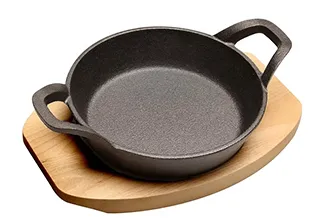
different types of dutch ovens
Exploring Different Types of Dutch Ovens
Dutch ovens have long been a staple in kitchens around the world, cherished for their versatility, durability, and ability to retain heat. Originating in the Netherlands, these cast-iron pots are now available in various materials and designs, each catering to different cooking needs and preferences. Let's delve into the different types of Dutch ovens and their unique features.
1. Cast Iron Dutch Ovens
The traditional cast iron Dutch oven is favored by many home cooks and professional chefs alike. Known for its exceptional heat retention and even cooking, this type is perfect for slow-cooking, braising, baking bread, and making stews. Many cast iron Dutch ovens come with an enameled coating, which eliminates the need for seasoning and makes cleanup a breeze. Brands like Le Creuset and Staub are renowned for their high-quality enameled cast iron Dutch ovens, available in a rainbow of colors that add a touch of style to the kitchen.
Aluminum Dutch ovens are a lighter alternative to cast iron, making them easier to handle and maneuver. They heat up quickly and distribute heat evenly, although they may not retain heat as well as cast iron. This type is often used for camping or outdoor cooking due to its lightweight nature. Some aluminum Dutch ovens are also coated with non-stick surfaces for easy cleaning. While they may not have the same enduring appeal as cast iron, they offer a more practical solution for certain cooking scenarios.
different types of dutch ovens

3. Ceramic Dutch Ovens
Ceramic Dutch ovens provide a stylish option for oven-to-table presentations. Typically lighter than their cast iron counterparts, these ovens are excellent for baking dishes and casseroles. They can handle high temperatures but are not suitable for direct flame or induction cooking. Ceramic Dutch ovens are often non-reactive, which means they won’t alter the taste of acidic foods. However, they can be more delicate and prone to chipping, so care needs to be taken when handling.
4. Stainless Steel Dutch Ovens
Stainless steel Dutch ovens are known for their sleek appearance and modern design. While they do not have the same heat retention as cast iron, they are lightweight and resistant to rust and corrosion. Many stainless steel options feature aluminum or copper cores, which enhance heat distribution. This type is perfect for those looking for a durable pot that can easily transition from stovetop to oven.
Conclusion
Whether you’re a seasoned chef or a casual cook, choosing the right Dutch oven can elevate your culinary creations. From the classic cast iron to the modern stainless steel, each type offers distinct advantages. Consider your cooking style, the types of dishes you prepare, and your personal preference when selecting the perfect Dutch oven to suit your kitchen needs. Regardless of your choice, a good Dutch oven is an investment that will last for years, becoming a beloved tool in your culinary arsenal.
-
Authentic Traditional Chinese Wok for High-Performance CookingNewsAug.02,2025
-
Season Cast Iron Perfectly with GPT-4 Turbo TipsNewsAug.01,2025
-
High Quality Cast Iron Cookware - Baixiang County Zhongda MachineryNewsAug.01,2025
-
Premium Cast Iron Pan: Durable & Perfect HeatNewsAug.01,2025
-
High Quality Kitchen Durable Black Round Cast Iron Cookware Pancake Crepe Pan-Baixiang County Zhongda Machinery Manufacturing Co., Ltd.NewsAug.01,2025
-
Cast Iron Cookware - Baixiang County Zhongda Machinery | Nonstick, Heat ResistanceNewsAug.01,2025


